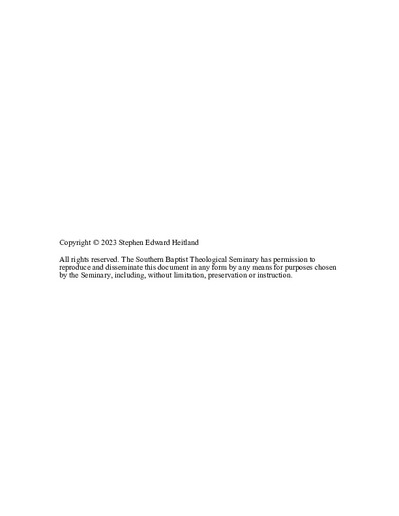A Powerful Word: On Defining and Responding Justly to Abuse
Subject
Power (Philosophy)Power (Philosophy)--Biblical teaching
Control (Psychology)
Control (Psychology)--Biblical teaching
Justice
Justice--Biblical teaching
Abstract
The topic of abuse has received increased societal scrutiny of late, and with good reason. Yet the very subjectivity of the term can be problematic, as most resources on abuse do not give adequate attention to the question of definition. In this dissertation, I define abuse as selfish compulsion to the pronounced detriment of another. This definition shares some similarities with the most prevalent paradigm today, which generally identifies abuse through the lens of power and control, in line with the Duluth Model and their Power and Control Wheel. However, the Duluth Model minimizes or misses altogether a positive understanding of power and control, especially as identified in Scripture, and therefore is liable to mislead, mislabel, or even malign when it comes to identifying and responding rightly to abuse. Further, the conceptions of justice that are brought to contemporary discussions on abuse are often unhelpfully influenced by Critical Theory, which obscures or dismisses a biblical understanding of justice. Therefore, the need for definitional and practical clarity on matters of abuse, oppression, and justice is great. This dissertation begins with an examination of the term and concept of abuse, including its historical and contemporary usage, before examining Scripture’s positive witness to power and control. Chapter 2 then examines the biblical text in order to present and defend a biblical definition of abuse. Chapter 3 turns to critique of the prevailing model, identifying how it does and does not overlap with the biblical perspective. Chapter 4 then examines justice, providing a succinct definition and examining the components necessary for acting justly when allegations of abuse are made. Chapter 5 concludes by offering several practical considerations for applying the concerns and principles developed throughout the work. An appendix offers alternative Wheels which represent my understanding of these important topics.

